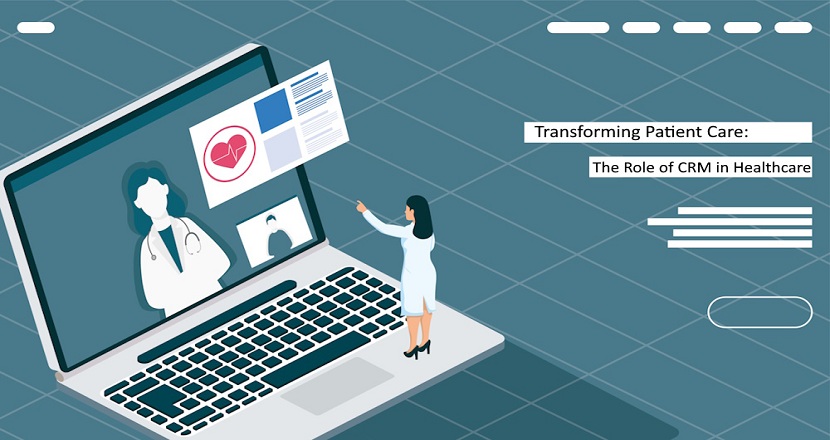The healthcare industry is a field where effective patient care management is crucial for improved outcomes. This necessitates the integration of innovative and efficient systems, a need that Customer Relationship Management (CRM) tools aptly fulfill. CRM, a data-driven solution, was traditionally used in sectors like retail and telecommunications. Today, it has permeated the healthcare sector, offering numerous benefits in managing patient care.
The Role of CRM in Healthcare
CRM tools are used in healthcare to manage patients’ data, improve service delivery, and enhance relationships with patients. By creating a central repository of patient information, they streamline access to records. Enabling doctors and other healthcare professionals to make informed decisions quickly. For instance, the Cleveland Clinic uses a CRM system to coordinate patient care across various departments and improving patient outcomes.
Benefits of CRM in Patient Care
CRM systems offer undeniable benefits to patient care. They improve communication, allow for better resource management, and enable personalized care. These tools can analyze patient data to identify trends and high-risk groups, informing prevention strategies. Moreover, they assist in the development of personalized care plans, ensuring that care is tailored to each individual’s unique needs. Here are some of the key benefits CRM offers in the healthcare sector:
- Improved Patient Experience: CRM systems provide healthcare professionals with a holistic view of each patient’s medical history, enabling them to offer personalized treatments and timely interventions.
- Enhanced Communication: CRM platforms facilitate seamless communication between patients and healthcare providers, ensuring that all parties are informed and engaged throughout the patient care process.
- Streamlined Operations: By centralizing data and automating routine tasks, CRM tools help to streamline healthcare operations, reduce redundancies, and improve efficiency.
- Data-Driven Decisions: CRM systems allow for the analysis of aggregated patient data, enabling healthcare providers to make informed, data-driven decisions.
- Increased Patient Retention: By offering improved communication and personalized care, CRM systems can enhance patient satisfaction and loyalty, and hence increase patient retention rates.
Implementing CRM in Healthcare Institutions
The implementation of a CRM system in healthcare institutions requires careful planning and consideration. Key steps include identifying institutional needs, selecting a suitable CRM system and closely monitoring the system’s performance once implemented. While challenges, such as resistance to change and data privacy concerns, may arise. These can mitigate with comprehensive training, enforcement of strict data security protocols. Also, emphasizing the benefits of CRM to all stakeholders. Certainly, here are some additional bullet points highlighting further benefits of CRM systems in healthcare:
- Proactive Healthcare Management: With a CRM system, healthcare providers can predict potential health issues based on a patient’s health history and lifestyle, enabling a more proactive approach to health management.
- Improved Resource Allocation: CRM systems allow healthcare institutions to track and analyze utilization rates of resources, which can lead to optimized resource allocation, reduced waste, and increased efficiency.
- Patient Empowerment: CRM platforms offer patients easier access to their own health records and appointment schedules. Promoting active engagement in their own healthcare journey.
- Enhanced Interdepartmental Collaboration: With a centralized database, CRM systems facilitate improved coordination and collaboration among different departments within a healthcare institution, leading to more efficient care delivery.
Future Trends of CRM in Healthcare
As digital innovation continues to evolve, so too will the capabilities of CRM in healthcare. Latest tech trends include enhanced ability to predict patient behaviors, integration with AI to improve diagnostics, and improved patient engagement through mobile CRM applications. These advancements will continue to revolutionize the healthcare industry, offering unprecedented opportunities for improved patient management.
- Patient-Centric Care: With the help of integrated CRM tools, healthcare providers can personalize and tailor care plans to suit individual patient needs and preferences, resulting in higher quality care and improved patient outcomes.
- Interdepartmental Collaboration: CRM systems facilitate better communication and collaboration between different departments within healthcare institutions, ensuring a seamless flow of information, minimizing errors, and improving overall service delivery.
- Efficient Resource Allocation: By mapping patient data and health trends, CRM systems enable healthcare institutions to allocate their resources more efficiently, reducing waste and boosting operational efficiency.
- Telemedicine Integration: With the rise of telemedicine, CRM systems can play a pivotal role in managing virtual consultations, maintaining patient records, and ensuring smooth remote patient care.
Conclusion
CRM for Healthcare is revolutionizing the way patient care is delivered. By serving as a centralized repository for patient data, bolstering communication channels, and facilitating the delivery of personalized care. CRM tools have become a cornerstone in enhancing patient outcomes. The healthcare landscape continues to develop, and CRM will undeniably remain at the helm of this evolution. With continuous technological advancements, CRM for Healthcare is anticipates to find even more groundbreaking applications. Thereby augmenting patient engagement and care.
The healthcare future is unequivocally oriented towards the patient. CRM is instrumental in propelling this shift towards improved care standards. It is incumbent upon us to seize these advancements and collectively direct our efforts towards a healthier future. We should explore and leverage the potential of CRM for Healthcare to maximize its many advantages and enhance patient results. Let’s together forge a more streamlined, cooperative, and patient-focused approach to healthcare, facilitated by CRM systems.

3 thoughts on “Transforming Patient Care: The Role of CRM in Healthcare”